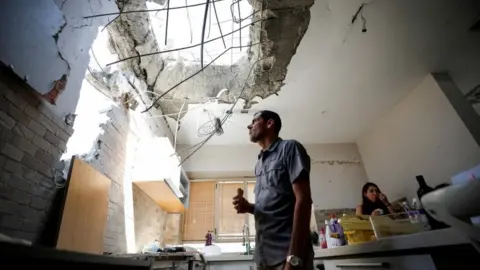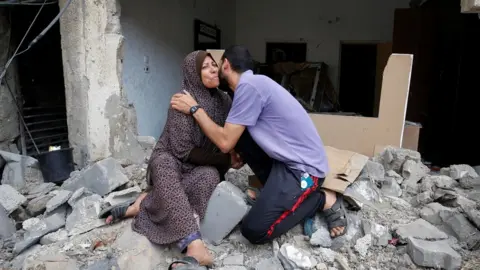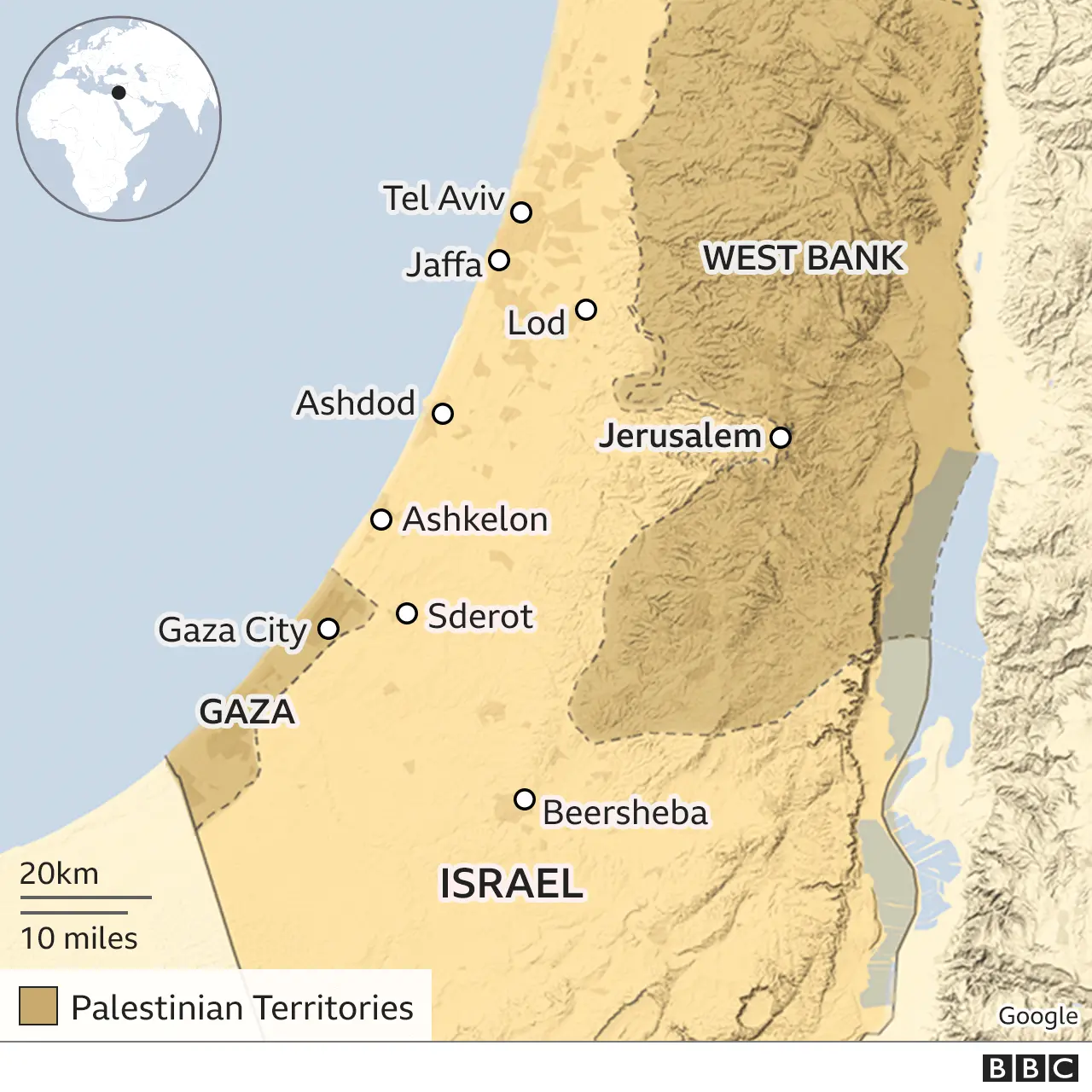Israel-Gaza ceasefire holds despite Jerusalem clash
A ceasefire between Israel and the Palestinian militant group Hamas in the Gaza Strip appeared to be holding hours after coming into effect.
It began early on Friday, bringing to an end 11 days of fighting in which more than 250 people were killed, most of them in Gaza.
Both Israel and Hamas claimed victory in the conflict.
Fresh clashes broke out at the al-Aqsa mosque compound in occupied East Jerusalem on Friday, testing the truce.
Israeli police spokesman Micky Rosenfeld told AFP news agency that Palestinians had thrown rocks and petrol bombs at officers, and that "riot" suppressing measures had been taken in response.
But the ceasefire seemed to be holding on Friday night. Israel has temporarily opened a crossing into Gaza, allowing food, fuel and medicine into the territory. The country has also lifted emergency restrictions inside its own borders.
The fighting between Israel and Palestinian militants in Gaza began on 10 May after weeks of rising Israeli-Palestinian tension in East Jerusalem that culminated in clashes at al-Aqsa, located at a holy site revered by both Muslims and Jews. Hamas began firing rockets after warning Israel to withdraw from the site, triggering retaliatory air strikes.
At least 243 people, including more than 100 women and children, were killed in Gaza, according to its health ministry. Israel has said it killed at least 225 militants during the fighting. Hamas has not given casualty figures for fighters.
In Israel 12 people, including two children, were killed, its medical service says.
The Israeli military says more than 4,300 rockets were fired towards its territory by militants and that it struck more than 1,000 militant targets in Gaza.
 Reuters
Reuters Reuters
Reuters

A countdown to the next conflict?
Gaza's streets are bursting back into life with the truce only hours old.
It's the first time in nearly a fortnight people have been able to go outside in relative safety.
Entire families step over rubble and children tiptoe through smashed glass.
They look up at wrecked buildings but seem to take it in their stride. Perhaps seeing the aftermath is easy compared with the terrifying experience of living through the airstrikes themselves.
On one street in the heart of downtown Gaza City is the remnants of al-Sharouq building. Its name means sunrise. It lies in charred ruins. The block was the third high-rise bombed by Israel which said militants used it.
A car drives past and a child in a keffiyeh - a Palestinian headscarf - stands out of the sunroof with his fingers in a victory sign.
Hamas is hailing its "defence of Jerusalem". Israel says its airstrikes have set the group back strategically. People here are welcoming calm, but know it probably just means a countdown to the next inevitable conflict.

What have the two sides said about the truce?
The Israeli Political Security Cabinet said on Thursday night it had "unanimously accepted the recommendation" for a ceasefire.
"The political leaders emphasised that the reality on the ground will determine the future of the campaign," it said.
Prime Minister Benjamin Netanyahu faced criticism from some in Israel who said he had halted the conflict too soon. The mayors of Sderot and Ashkelon - two of the Israeli towns hardest hit by rockets from Gaza - were among those to voice their disappointment, saying Hamas should have been eliminated.
At a news conference on Friday, the prime minister said Israel had "exacted a heavy price from Hamas".
"Not everything is known to the public yet, nor to Hamas, but the full range of achievements will be revealed over time," he said.
A Hamas official told the Associated Press news agency the ceasefire announced by Israel amounted to a "victory" for the Palestinian people.
This view was shared by people celebrating on the streets of Gaza. "This is the day of victory, the day of freedom, and it is the most beautiful day that we've experienced," one said.
Top Hamas political leader Ismail Haniya told reporters on Friday that the fighting had "defeated the illusions of negotiations, and described resistance as the "best strategic choice for liberation".
"We, as a movement and movement's leadership, with all our people and the good people of this nation and the world, will rebuild Gaza," he added.
Basem Naim, from the Hamas Council on International Relations, told the BBC he was sceptical about whether the truce would last "without justice for Palestinians, without stopping the Israeli aggression and Israeli atrocities".
A member of Hamas's political bureau, Izzat al-Reshiq, issued a warning to Israel.
"It's true that the battle ends today but Netanyahu and the whole world should know that our finger is on the trigger and we will continue to ramp up the capabilities of this resistance," he told Reuters.
What position did the US take?
President Joe Biden said the ceasefire had brought a "genuine opportunity" for progress, and commended Mr Netanyahu in a phone call after the agreement was announced.
He said the US - Israel's closest and most important ally - fully supported the country's "right to defend itself against indiscriminate rocket attacks".
He also praised Egypt's President Abdul Fattah al-Sisi for brokering the ceasefire, before turning to the human cost of the conflict.
"I send my sincere condolences to all the families, Israeli and Palestinian, who have lost loved ones and my hope for a full recovery for the wounded," he said.


The president said the US remained committed to working with the UN in providing humanitarian assistance to Gaza and in reconstruction efforts in the enclave. He added that this would be done "in full partnership" with the Palestinian Authority, which is run by Hamas's rival, Mahmoud Abbas, and based in the Israeli-occupied West Bank.
Egypt's president said he had received a phone call from Mr Biden with "utter happiness", adding that they had "exchanged visions around reaching a formula that would calm the current conflict between Israel and Gaza".
British Prime Minister Boris Johnson also welcomed the ceasefire, but said both sides must now find a "durable solution" to the conflict.

Are you in Israel or Gaza and affected by these events? Please share your story by emailing haveyoursay@bbc.co.uk.
Please include a contact number if you are willing to speak to a BBC journalist. You can also get in touch in the following ways:
- WhatsApp: +44 7756 165803
- Tweet: @BBC_HaveYourSay
- Please read our terms & conditions and privacy policy
If you are reading this page and can't see the form you will need to visit the mobile version of the BBC website to submit your question or comment or you can email us at HaveYourSay@bbc.co.uk. Please include your name, age and location with any submission.
